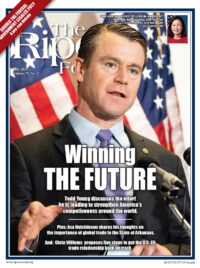Will 2021 be a year of reform or irrelevance?
Already in its first months, 2021 has proven to be remarkably eventful, with the full-scale assault on American democracy in the storming of the Capitol and a pandemic that continues to break records in human suffering now playing out in India and many other parts of the world.
Amid all this turmoil, trade wonks might be forgiven if we forget that it has been nearly 75 years since the start of negotiations that established the multilateral trading system. Of course, the trade system itself has been in something of a turmoil in recent years and is now at a crossroads. Fortunately, the multilateral trading system may be ready to turn the corner towards a future that offers stability and progress.
Indeed, signs are emerging that the World Trade Organization might finally be ready to reestablish its credibility as the strong foundation on which virtually every trade relationship in the world is built. The WTO has new leadership, in the person of the first female and first African Director General, Ngozi Okonjo-Iweala. It has survived the burn-down-the-house antics of an erratic U.S. administration, led by a President who reveled in making threats to leave it. And it appears to have finally sunk in across broad sections of its membership that a long series of failures to update its structure and reform its rules must be reversed, even if that involves subgroups of WTO members taking the initiative before the whole follows along.
Signs are emerging that the World Trade Organization might finally be ready to reestablish its credibility as the strong foundation on which virtually every trade relationship in the world is built.
This more optimistic scenario will depend on addressing several critical challenges: 1) reforming and reinvigorating its dispute settlement system; 2) resetting dynamics among key nation players; and, 3) completing negotiations on a first set of new agreements and embarking on a series of new ones.
The first challenge should be the most straightforward, even if it is no easy task. The United States single-handedly sabotaged the effective operation of WTO dispute settlement during the Trump administration by refusing to agree to appoint new Appellate Body members when terms ended. The United States has legitimate gripes about a history of overreach by the Appellate Body extending back to previous administrations, but now that it has support for reforms from other key members, such as the European Union, the Biden Administration can lead the WTO out of the current crisis and put the dispute settlement system, once the envy of other multilateral organizations, back into business.
The second challenge – fostering a better sense of shared purpose across the membership — is much more complicated, as blame for the present dysfunctional dynamics can be spread far and wide. Too many developing countries rely on “special and differential status” to excuse protectionist policies, and there must be greater willingness to adapt to full implementation of WTO agreements. There also tends to be too much “group-think” with large contingents of WTO members too ready to go with the flow in endorsing positions of the most disruptive voices, generally India and South Africa, even if their individual circumstances might argue in favor of support for middle-ground compromises. And many of the developed countries are always ready to give lip service to the importance of revitalizing the WTO but have tended to prioritize negotiating trade agreements outside its structure. Of course, then there is China, primarily motivated to keep its non-market and trade distortive practices — such as state aid to and through state-owned enterprises — free of negotiated new disciplines.
The World Trade Organization can have a bright future. But that future is certainly not assured, and threats to it will continue to expand as countries seek out alliances outside of the WTO.
Finally, the third critical need in order to realize a newly invigorated WTO is demonstrated success in negotiating new agreements, in whatever form that requires. The ideal new agreements would be multilateral ones, such as the Trade Facilitation Agreement concluded at the Bali Ministerial Conference in December 2013. However, truly multilateral agreements may have to wait until the WTO has chalked up some successes through “plurilateral” approaches. There is a lot of attention to ongoing negotiations to eliminate harmful fisheries subsidies, which have contributed for decades to the dire straits of global fisheries. If a strong multilateral agreement by the Ministerial meeting at the end of this year proves unattainable, a smaller coalition of the willing and ambitious should follow up with a plurilateral effort. Even the ongoing plurilateral negotiations on electronic commerce may require some paring of participation to get to a worthwhile set of disciplines for the digital economy of the future. Prospects for WTO results that can contribute to the global response to COVID may depend on finding room for common ground on vaccines and intellectual property rights.
A more focused and relevant WTO can have a bright future. But that future is certainly not assured, and threats to it will continue to expand as countries seek alliances outside of the WTO whether in free trade agreement form or other structures, such as supply chain partnerships. For that reason, the opportunity to turn things around in 2021 should not be missed if the WTO is to remain the bulwark for a liberal global economy for years to come.
Mark Linscott is a senior fellow with the Atlantic Council’s South Asia Center and a senior advisor at the Asia Group. He served as the Assistant U.S. Trade Representative for WTO and Multilateral Affairs from 2012 to 2016 with responsibility for coordinating U.S. trade policies in the WTO, and as the Assistant U.S. Trade Representative for South and Central Asian Affairs from December 2016 to December 2018.





